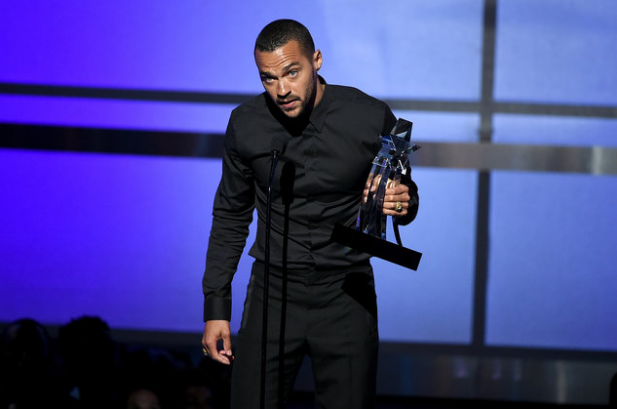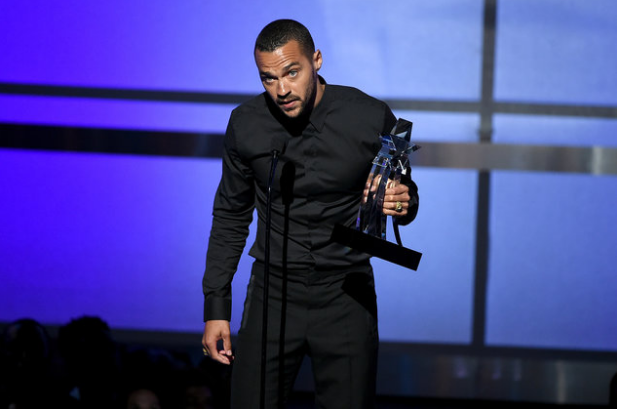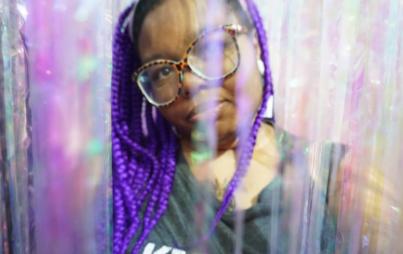
Image: Billboard.com
I feel like it is safe to say that many of you — nay, most of you — did not watch the BET awards last night. Don’t feel bad — I didn’t watch it either. Mother Nature had other ideas in mind when she knocked out our Internet with a nasty storm, and the men of the house just had to get their Game of Thrones on.
However, I have since unapologetically gobbled up every highlight I could get my hands on, twice, and all I can say is DAMN. From Beyoncé and Kendrick Lamar opening the show with “FREEDOM,” and flames and water, and Black Panther power everywhere, to Desiigner looking like he might mess around and punch you in the eye if you were standing in the wrong spot during “Panda” — the show was epic, plain and simple.
But then there was Jesse.
Beautiful, eloquent, made-you-rewatch-Grey’s-Anatomy Jesse Williams.
He was being honored with the BET Humanitarian Award for the relentless, outspoken, and unflinching work he has done (and continues to do) on behalf of the Black community.
He opened his mouth and time stood still. My pulse quickened. My heart raced. My eyes filled with tears. And I. WAS. PROUD.
Watch his speech here, and then, as usual, I have something to say after. Don’t act surprised.
Whoooooooooo!!!! Slow cap, church stomp, and HALLELUJAH!!! Can someone please bring me a church fan and a kleenex! Did you see Jesse’s daddy standing there, looking so proud of his son? I got the feels, folks. Jesse starts off by thanking his parents.
“I want to thank them for being here, and for teaching me to focus on comprehension over career, they made sure I learned what the schools are afraid to teach us.”
Let me ask you something. In grades K-8, who did you learn about when it came to slavery and the Civil Rights Movement? I am going to guess Harriet Tubman, maybe Sojourner Truth, Rosa Parks, and Martin Luther King. Am I right? What about high school history class?
Now, this might be a bit different for all of us, based on where we went to high school, and who our teachers were. I went to high school in Arizona, and I don’t recall learning about anyone other than the same four people I previously listed (Panthers of ‘95, help me out).
However, one of my girlfriends taught history in a Renton, WA high school and delved deep into the unsung heroes of slavery and the Civil Rights Movement. That being said, the point Jesse is making is that by and large, our children (and yours) are not learning the full history of the United States of America.
They are not learning about Fannie Lou Hamer, Nat Turner, Frederick Douglass, WEB DuBois, Robert Smalls, Miriam Makeba, or Romare Bearden — or Cesar Chavez and Nana for that matter. He learned about these people (and their contributions to the very fabric of our country) at home. Not in an educational setting, where one would expect such things to be taught.
I don’t think I need to point out how problematic this is.
Next, Jesse states*:
This award is not for me. This is for the real organizers all over the country, the activists, the civil rights attorneys, the struggling parents, the families, the teachers, the students that are realizing that a system built to divide and impoverish and destroy us cannot stand if we do. It’s kinda basic mathematics: the more we learn about who we are and how we got here, the more we will mobilize.
In short, the more you know, the more you grow, and the more we grow, the less the system will be able to hold us down. This goes for allies as well. Learn something. Stand with us and behind us (never in front, folks, never in front) as we stand up to the plethora of injustices we face on a daily basis.
Moving along, he gave a much-needed nod to the sistas:
“This award is also for the black women in particular who have spent their lives nurturing everyone before themselves.”
I may or may not have thrown my head scarf at my computer screen at this part. This is historical-to-present-day truth right here. During the days of slavery, Black women were often forced to nurse the master’s children before her own. By the time the day was over, she was lucky if her nipples weren’t cracked and bleeding from excessive sucking. She would feed her child, only if she could.
As slave times passed and the days of “the maid” came along, again, Black women cared for the children of the lady of the house, often leaving her children with family and friends. If their child had chicken pox and the child they cared for had the common cold — too bad, so sad. Little Johnny needed his mammy.
If they were sick, they went to work. If they were in pain, they went to work. If they were dying, they went to work. There was no choice. When husbands, sons, and fathers were being lynched by the dozens (and by the hour), someone had to care for the family. It was the Black woman’s job to keep her family intact, safe, fed, and alive.
Today, the incarceration rate of Black men is damn near six times the incarceration rate of White men. So, essentially, Black men are still being lynched by the dozens and by the hour — this time, it’s just systemic and legal. And because of this, Black women are still in the same position: caring for others before caring for self because every Black man incarcerated is someone’s husband, son, or father. And the Black woman is again left to hold it together.
Jesse knows it, and he gave the proverbial head nod and shout-out.
This next part is pretty self-explanatory, but I’ll do you a solid and break it down so it can forever and consistently be broke.
(p.s. That’s a line from one of my favorite movies, Love Jones. WATCH IT.)
“Now, what we’ve been doing is looking at the data and we know that police somehow manage to de-escalate, disarm, and not kill white people every day. So what’s going to happen is we’re going to have equal rights and justice in our own country or we will restructure their function and ours.”
Translation: You know and we know that this shit ain’t nowhere even CLOSE to equal and just, so either y’all are gonna fix this shit and get it right, or we will march and scream and holler and sit-in and protest and make so much noise that you will have no damn choice other than to fix it, and then thank us for opening your eyes, mmmmkaaaaaayyyyy?
Jesse continues, talking about how Tamir Rice would have just celebrated his 14th birthday if he were alive, and how the times that Rekia Boyd, Eric Garner, and Sandra Bland were killed in, are not so far removed from the times of the past. He also stated something that made my edges curl and my teeth clench.
The thing is though, all of us here are getting money, that alone isn’t going to stop this. Dedicating our lives to getting money just to give it right back to put someone’s brand on our body — when we spent centuries praying with brands on our bodies, and now we pray to get paid for brands on our bodies?
There has been no war that we have not fought and died on the front lines of. There is no job we haven’t done, there is no tax they haven’t levied against us, and we have paid all of them. But freedom is always conditional here. “You’re free!” they keeping telling us. “But she would be alive if she hadn’t acted so… free.” Now, freedom is always coming in the hereafter, but the hereafter is a hustle: We want it now.
Folks, the portrait painted with these words is heartbreaking and Black-fist-in-the-air proud all at the same time. “When we spent centuries praying with brands on our bodies” — in case you didn’t know, slaves were often branded with either a number or a letter that corresponded to their owner's name.
If they ran and were caught, they knew who to be returned to. Or if they disobeyed an order, they were branded as a form of punishment. According to a scholarly article, “The Branding of American Slaves,”
“The branding of African American slaves was widespread and was performed either for identification purposes or as a punishment.1 The bodily areas branded varied in location, such as the back, shoulder, or abdomen, with the face being a favorite site for punishment.
The procedure for branding was described by Frederick Douglass, who escaped slavery and became an important public figure in the abolitionist movement. In an address delivered in England on September 1, 1846, Douglass said, “The process of branding was this — A person was tied to a post, and his back, or such other part as was to be branded, laid bare; the iron was then delivered red hot (sensation), and applied to the quivering flesh, imprinting upon it the name of the monster who claimed the slave. ”2
The picture of this is horrifying, but it’s another one of those things we don’t learn about. He then points out that as entertainers, many trade in their social responsibility for more money in the wallet (“and now we pray to get paid for brands on our bodies”).
Truth be told, as far as I’m concerned, this stands true for every entertainer that was at the awards show, Black or otherwise.
The last part, however, is where the gut punch lies.
“But freedom is always conditional here. 'You’re free!' they keeping telling us. 'But she would be alive if she hadn’t acted so… free.’“
This is what freedom looks like for Black men, women, and children across the country:
Sandra Bland changed lanes without using her turn signal.
Tamir Rice was playing in front of his apartment building.
Trayvon Martin was walking home.
Rekia Boyd was standing in in a park.
Oscar Grant was waiting for the train.
Amadou Diallo was trying to open the door to his apartment.
Jordan Davis was listening to music in a car with friends.
Akai Gurley opened a door in a dark stairwell.
Eric Garner was standing in front of a store.
John Crawford III was buying a BB gun for his kid at Walmart.
I’m not expanding on that statement. I think I’ve said enough. As a matter of fact, I’m actually going to end this piece with the final statement from Jesse’s speech, because he literally sums up every thought I have with his last moments on the mic. Meditate on it, folks, because this is just the beginning of that televised revolution I told you about.
Can’t say I never gave ya nothin’. I just gave you a whole hell of a lot to think about.
Let’s get a couple of things straight. The burden of the brutalized is not to comfort the bystander — that’s not our job so let’s stop with all that. If you have a critique for our resistance then you’d better have an established record, a critique of our oppression. If you have no interest in equal rights for black people then do not make suggestions to those who do: sit down. We’ve been floating this country on credit for centuries, and we’re done watching and waiting while this invention called whiteness uses and abuses us, burying black people out of sight and out of mind while extracting our culture, our dollars, our entertainment like oil — black gold! — ghettoizing and demeaning our creations and stealing them, gentrifying our genius and then trying us on like costumes before discarding our bodies like rinds of strange fruit. Just because we’re magic doesn’t mean we’re not real. Thank you.
*Transcribed portions of Jesse WIlliams’ speech were taken from this Billboard.com article








